Farmer's Welfare
Deendayal Antyodaya Yojana- National Rural Livelihoods Mission
A Blueprint for Empowering Rural Communities
Posted On:
23 OCT 2025 10:09AM
Takeaways
- Mobilized 10.05 crore rural households into 90.9 lakh SHGs across India.
- Supported 4.6 crore Mahila Kisans and 3.74 Lakh enterprises through entrepreneurship programs.
- Trained 17.5 lakh rural youth under DDU-GKY, with a total of 11.48 lakh already placed.
- Deployed 47,952 Bank Sakhis to boost rural financial inclusion and credit access.
- Promoted sustainable livelihoods through agriculture, non-timber forest produce, livestock, and non-farm enterprises.duction
Deendayal Antyodaya Yojana - National Rural Livelihood Mission (DAY-NRLM) is a flagship poverty alleviation program being implemented by the Ministry of Rural Development, Government of India to reduce poverty by enabling poor households to access gainful self-employment and skilled wage employment opportunities resulting in sustainable and diversified livelihood options for the poor. DAY-NRLM aims at mobilizing rural poor households into Self Help Groups (SHGs) and continuously nurturing and supporting them to take economic activities till they attain an appreciable increase in income over a period of time to come out of abject poverty.
The success of DAY-NRLM is evident in the way it has transformed rural lives. One such tale is of Meghalaya’s, Heinidamanki Kanai, who’s journey of becoming a successful entrepreneur began when she joined the Kyrshanlang Self-Help Group (SHG) in January 2020. With the support of her SHG and guidance from the National Rural Livelihoods Mission (NRLM), Heinidamanki began making hand- made soaps—rose, aloe vera, orange, and lemon grass. Her hard work began to pay off in August 2023, just a few months after starting her business in April. Seeing her potential, she secured a bank loan of Rs. 1.8 lakh through her SHG. With this, she bought new machinery, tools, and even conducted lab testing to ensure the quality of her soaps.
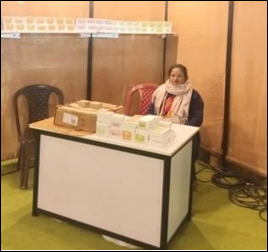
Slowly but steadily, Heinidamanki’s venture flourished. Her annual income crossed Rs. 1 lakh, transforming her life and giving her the confidence to dream even bigger. She didn’t stop at her own success, she began training other SHG members from her village in soap making, spreading knowledge and inspiring others to follow their entrepreneurial dreams.
National Rural Livelihood Mission (NRLM) was launched in 2010 as a mission-mode scheme by restructuring the erstwhile Swarnajayanti Grameen Swarojgar Yojana (SGSY). In 2016, the program was renamed Deendayal Antyodaya Yojana – National Rural Livelihood Mission (DAYNRLM). The central and state governments jointly fund this centrally sponsored scheme. It is one of the world's largest initiatives to improve the livelihoods of the poor. The Mission seeks to achieve its objective through investing in four core components:
social mobilization and promotion and strengthening of self-managed and financially sustainable community institutions of the rural poor women;
financial inclusion;
sustainable livelihoods; and
social inclusion, social development and access to entitlements through convergence
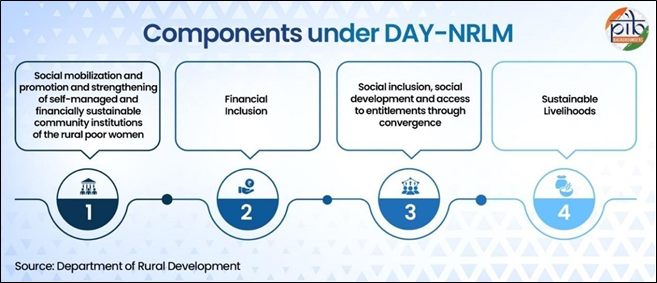
Objectives of DAY-NRLM
DAY-NRLM promotes building strong institutions such as Self-Help Groups (SHGs) for the poor, particularly women, and enabling these institutions to access a range of financial services and livelihoods. These institutions provide them with long-term support to diversify their livelihoods, enhance their incomes, and improve their quality of life. Most of the mission’s interventions are being implemented and scaled up by the SHG women themselves who are trained as community resource persons (CRPs) – Krishi Sakhis, Pashu Sakhis, Bank Sakhis, Bima Sakhis, Banking Correspondent Sakhis, etc. The Mission is also working on empowering the SHG women through awareness generation and behaviour change communication on issues like domestic violence, women’s education and other gender-related concerns, nutrition, sanitation, health, etc. The aim of the SHGs created under this scheme is to facilitate:
Access to formal credit;
Support for diversification and strengthening of livelihoods; and
Access to entitlements and public services.
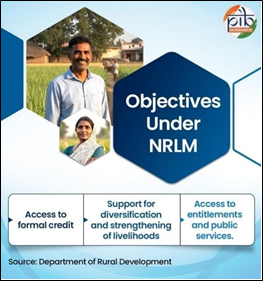
Women Empowerment via DAY-NRLM
The mission's core objective is to reduce poverty by enabling poor households, particularly women, to access financial services, diversify their livelihoods, and improve their quality of life. Financially, the mission empowers women by fostering community institutions that provide crucial financial, technical, and marketing resources. A significant landmark milestone has been achieved under the Deen Dayal Antyodaya Yojana – National Rural Livelihoods Mission (DAY-NRLM) by disbursing over Rs. 11 lakh crores in credit to women Self-Help Groups (SHGs) through formal financial institutions. This is facilitated by women trained as Bank Sakhis and Banking Correspondent Sakhis, who act as liaisons between SHGs and formal banking institutions. The Rs. 11 lakh crore disbursement, supported by collateral- free loans, interest subventions, and other financial assistance, is further underscored by an exceptional repayment rate of over 98 percent, showcasing the effectiveness and sustainability of these programs.
In terms of livelihood, DAY-NRLM supports both farm and non-farm activities. It empowers women farmers, known as 'Mahila Kisans', by promoting agro-ecological practices and has covered 4.62 crore women under these interventions. A strong network of trained livelihood Community Resource Persons called as KrishiSakhi and PashuSakhi are deployed to handhold and provide round the year extension services to the mahilakisans.
The mission also promotes micro-enterprises in areas like handicrafts and food processing through sub-schemes such as the Start-up Village Entrepreneurship Program (SVEP), which has supported over 3.74 lakh enterprises. The Mission is also working on empowering the SHG women through awareness generation and behaviour change communication on issues like domestic violence, women’s education and other gender-related concerns, nutrition, sanitation, health, etc.
Krishi Sakhi is a Community Agriculture Service Provider (CASP) who ensures last-mile support in rural areas where farm-based services are scarce or costly. Promotes awareness and builds community capacity in sustainable agriculture, while also facilitating the aggregation and marketing of agricultural produce to improve farmers’ incomes.
Bank Sakhi is a trained Self-Help Group (SHG) member stationed at a bank branch to support SHGs with financial services. She helps open SHG savings accounts, facilitates both credit and debit transactions, and plays a key role in enabling credit linkage so SHGs can access loans and other banking facilities.
Pashu Sakhi is a Community Animal-care Service Provider (CASP) who ensures last-mile livestock services in rural areas where veterinary care is scarce or costly. Pashu Sakhi raises awareness, builds community capacity in livestock-based livelihoods, and helps aggregate and market livestock products to improve rural incomes.
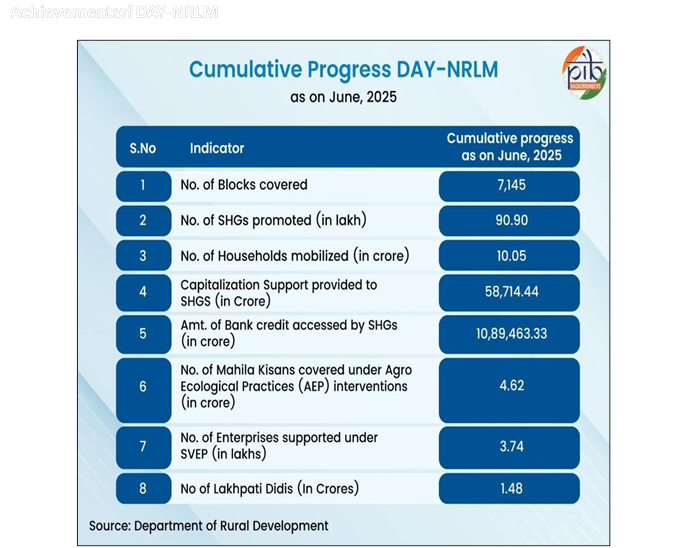
DAY-NRLM has mobilized 10.05 crore rural women households into more than 90.90 lakh SHGs across 28 States & 6 UTs. Other notable achievements include:
- 4.62 crore SHG members engaged as Mahila Kisans.
- 3.5 lakh Krishi Sakhis & Pashu Sakhis deployed.
- 6,000 Integrated Farming Clusters formed.
- 1.95 lakh Producer Groups, benefiting over 50 lakh rural women.
- 3.74 lakh enterprises supported in 282 blocks.
- Women SHGs accessed ₹11 lakh crore in loans since 2013-14.
- 47,952 Bank Sakhis deployed in the bank branches to facilitate credit linkage of the SHGs
High-performing states under DAY- NRLM
- As of June 30, 2025, Bihar, Uttar Pradesh, and Andhra Pradesh are among the states with largest number of Self-Help Groups (SHGs) and have mobilized the highest number of women households into SHGs since the inception.
In terms of financial support and inclusion, several states have shown exemplary performance in FY 2024-25 as on 28th Feb 2025. For capitalisation support provided to Self-Help Groups (SHGs), Uttar Pradesh and Bihar have disbursed ₹1,23,326 lakh and ₹1,05,132 lakh respectively, both exceeding their targets. When it comes to facilitating bank loans for SHGs, Andhra Pradesh leads the nation with a disbursement of ₹34,83,725 lakh.
Regarding the promotion of sustainable livelihoods, different states have excelled in farm and non-farm sectors. In farm-based initiatives, Maharashtra stands out for covering the highest number of 'Mahila Kisans' (women farmers) under Agro-Ecological Practices, with 12,97,051 women covered, followed by Uttar Pradesh (11,37,950) and Andhra Pradesh (10,43,085). For promoting non-farm micro-enterprises under the Start-up Village Entrepreneurship Programme (SVEP), Assam is the leading state, having supported 9,557 enterprises, with Kerala (5,802) and West Bengal (4,933) also showing strong performance.
Skill Development and Employment Programs under DAY-NRLM
The Ministry implements two Centrally Sponsored Schemes under DAY-NRLM, which aim to equip rural poor youth with skills for gainful employment and contribute to poverty alleviation through the following programs:
- Deen Dayal Upadhyaya Grameen Kaushalya Yojana (DDU-GKY): Provides placement-linked skill training for rural youth aged 15–35 years. The program ensures practical skill development aligned with job placements, enabling participants to earn wages at or above the minimum wage in the formal job market. A total of 17.50 lakh candidates has been trained and a total of 11.48 lakh have been placed, as of June 2025.
- Rural Self Employment Training Institutes (RSETIs): Bank-sponsored centres for youth aged 18–50 that provide entrepreneurship training and promote self- and wage-employment, with financial support for infrastructure and training costs. A total of 56.69 lakh candidates has been trained and a total of 40.99 lakh have been settled since inception till June 2025.
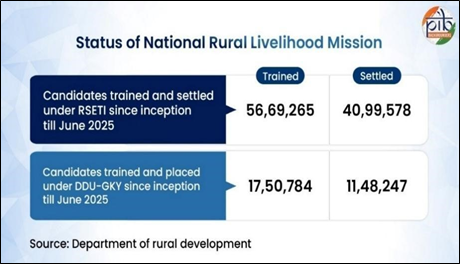
|
High-performing states under DDU-GKY (2014-15 to June 2025)
Under DDU-GKY, Uttar Pradesh has trained the highest number of candidates at 2,44,528, followed by Odisha with 2,15,409 and Andhra Pradesh with 1,33,842. When it comes to job placements, Odisha leads with 1,77,165 candidates placed, while Andhra Pradesh also shows strong performance with 1,17,881 placements.
Top states in RSETI (2014-15 to June 2025)
Under the RSETI programme, Uttar Pradesh stands out as the top-performing state, having trained the highest number of candidates (7,55,966) and successfully settled the most entrepreneurs (5,54,877). Other states with significant achievements in both training and settlement include Rajasthan (4,34,478 trained; 3,19,948 settled), Madhya Pradesh (4,36,835 trained; 3,08,280 settled), and Karnataka (4,19,299 trained; 3,05,397 settled).
|
Advanced and Marketing Training under DAY-NRLM
Steps taken by the Government to impart advanced training and marketing skills to SHG members, particularly women are:
- National and State-level SARAS Aajeevika Melas are organized annually, providing specialized training for marketing and related competencies. The most recent one took place in New Delhi from 5 – 22 September 2025.
(Know more about SARAS Aajeevika Mela 2025 click @ https://www.pib.gov.in/FeaturesDeatils.aspx?NoteId=155247&ModuleId=2 )
- The National Institute of Rural Development and Panchayati Raj (NIRD&PR) conducts Training of Trainers on marketing skills to build the capacity of SHG members and rural entrepreneurs supported under DAY-NRLM. Over the past three years, NIRD&PR has conducted 44 training and capacity-building programs.
Conclusion
The DAY-NRLM has become a cornerstone of rural poverty alleviation and women’s empowerment in India. It has expanded access to formal credit, skills, and market opportunities, enabling sustainable livelihoods and financial resilience. Through focused initiatives in skill development, entrepreneurship, and convergence with key government schemes, NRLM has diversified income sources and strengthened the rural economy. Its robust monitoring systems, strong SHG–bank linkages, and capacity-building measures ensure transparency and accountability, making it a powerful driver of inclusive growth and improved living standards in rural communities.
References
Ministry of Rural Development
https://static.pib.gov.in/WriteReadData/specificdocs/documents/2023/dec/doc2023126279701.pdf https://aajeevika.gov.in/home https://aajeevika.gov.in/what-we-do/institutional-capacity-building https://darpg.gov.in/sites/default/files/National%20Rural%20Livilihood%20Mission.pdf https://aajeevika.gov.in/about/goal https://nrlm.gov.in/dashboardForOuter.do?methodName=dashboard https://sansad.in/getFile/loksabhaquestions/annex/185/AU380_bavCuN.pdf?source=pqals https://sansad.in/getFile/loksabhaquestions/annex/185/AU2551_O3P2KL.pdf?source=pqals https://sansad.in/getFile/loksabhaquestions/annex/185/AS138_slGOkB.pdf?source=pqals https://sansad.in/getFiles/loksabhaquestions/annex/185/AU3714_fGFnWZ.pdf?source=pqals https://sansad.in/getFile/loksabhaquestions/annex/185/AU380_bavCuN.pdf?source=pqals https://sansad.in/getFile/loksabhaquestions/annex/185/AU4171_T2uTD0.pdf?source=pqals https://sansad.in/getFile/loksabhaquestions/annex/185/AU2591_TWzqam.pdf?source=pqals https://www.pib.gov.in/FactsheetDetails.aspx?Id=149112 https://www.pib.gov.in/PressReleasePage.aspx?PRID=2043778 https://www.pib.gov.in/PressReleasePage.aspx?PRID=2112203 https://msrls.nic.in/sites/default/files/pldsuccess-storiesmeghalaya.pdf
https://asrlms.assam.gov.in/sites/default/files/swf_utility_folder/departments/asrlm_pnrd_uneecopscloud_com_oid_66/portlet
/level_2/Guidance%20Note_Krishi%20Sakhi.pdf
https://asrlms.assam.gov.in/sites/default/files/Hand%20Book%20for%20Bank%20Sakhi.pdf https://asrlms.assam.gov.in/sites/default/files/swf_utility_folder/departments/asrlm_pnrd_uneecopscloud_com_oid
_66/portlet/level_2/Guidance%20Note_Pashu%20Sakhi.pdf https://lakhpatididi.gov.in/about-lakhpati-didi/
https://www.pib.gov.in/PressReleasePage.aspx?PRID=2149656
Click here for pdf file.
***
SK/SM
(Backgrounder ID: 155655)
Visitor Counter : 437
Provide suggestions / comments